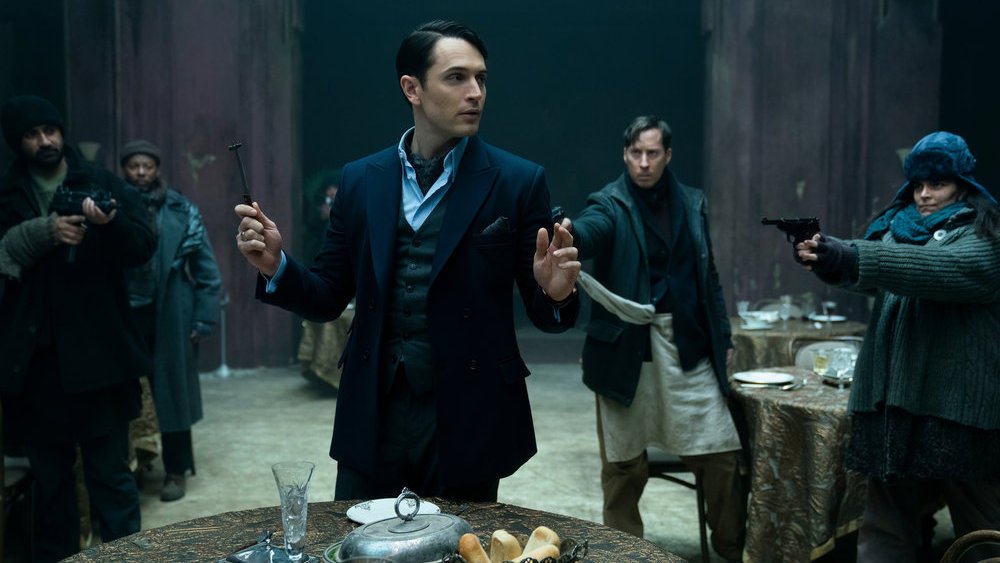
I’ll give “The Continental” this: of all the reasons the “John Wick” prequel frustrates, underwhelms and disappoints, the involvement of Mel Gibson barely manages to rank. That, at least, is a major accomplishment.
The three-part series, subtitled “From the World of John Wick,” was anticipated by a steady stream of red flags: a gap of more than half a decade between the official greenlight and Wednesday’s premiere; the move from Starz, a network owned by franchise studio Lionsgate, to Peacock; the news that Chad Stahelski, the stunt performer turned action auteur, would not direct any episodes, though he retains an executive producer credit. (Let’s also throw in the casting of Gibson, whose rehabilitation after a history of racism, antisemitism and alleged domestic violence has been as dispiriting as it is inevitable.) In its final form, “The Continental” bears these misgivings out. The show lacks the star power and visual panache of “John Wick,” and what it adds is directly at odds with the movies’ source of appeal.
Developed by Greg Coolidge, Kirk Ward and Shawn Simmons, “The Continental” stars Colin Woodell as a younger version of Winston Scott (Ian McShane), the proprietor of the titular boarding house’s New York branch. Asking an actor to channel presence and gravitas like McShane’s is essentially a suicide mission, and “The Continental” only makes matters worse by framing Winston as a faint echo of Keanu Reeves’ avenging ex-assassin, transplanted to 1970s New York and weighed down with unnecessary backstory.
The beauty of “John Wick” is its blend of baroque excess with elegant simplicity. The first movie had a bare-bones plot, a skeleton scaffolding on which to hang set piece after set piece. John Wick’s dog, a gift from his deceased wife, is killed; those responsible must suffer. Only in subsequent installments was this Hammurabic fable built into an elaborate mythology. A global, underground network of contract killers is governed by a sacred code and a shadowy group known only as the High Table. The Continental, with its many locations, is where they can conduct their business in safety — provided they can pay their way with a special coin. But as the world around him expands, John Wick remains an almost comically single-minded figure, fighting and grunting his way to a hard-won demise at the end of “Chapter 4.”
“The Continental” spoils this delicate balance. Winston’s primary motivation is the death of his brother Frankie (Ben Robson), which sets him on a collision course with the Continental’s sadistic manager Cormac (Gibson). But this premise isn’t in place until the closing scenes of the 86-minute pilot, which means it takes “The Continental” nearly the length of the entire first “John Wick” movie even to set its story in motion. In all that time, neither Frankie nor Winston stand out as compelling leads; we’re simply instructed to care about them via black-and-white flashbacks to their impoverished Bronx childhoods that open each episode.
The season stretches the three-act structure of a movie into three episodes, each themselves the length of a feature film. First, Winston sets his sights on Cormac; Woodell’s growling delivery of the line “Guns. I need lots of guns” is a clear, if futile, attempt to channel Reeves. Then, he assembles a crew, including Frankie’s ex-partner Yen (Nhung Kate) and arm-dealing siblings Lou (Jessica Allain) and Miles (Hubert Point-Du Jour). Finally, the three mount an assault on The Continental itself, punching and slashing their way through the halls. The conclusion is foregone, yet “The Continental” shuffles toward it without the style or verve that can make the journey worthwhile. A neon-lit party scene is a pale imitation of, say, the Rome rager from “Chapter 2,” and the all-important fight scenes are largely forgettable. Besides Cormac, the main antagonists are a pair of killer twins who go by Hansel (Mark Musashi) and Gretel (Marina Mazepa), another faint echo of a prior Reeves masterwork. The color palette is often exactly the drab, desaturated mess the movies offer a refreshing break from.
Despite the name, “The Continental” offers little new information as to the hotel’s origins or operations, which might be of interest to devoted “John Wick” fans. Instead, the show heaps on emotional context that runs counter to the films’ artful minimalism. After his death, Frankie gets retroactive exposition about his time in the Vietnam War; a police detective named KD (Mishel Prada) takes an interest in Winston, spoiling the series’ magical absence of normal law enforcement in favor of assassins’ secretive self-government. Only Charon (Ayomide Adegun), the future concierge first played by the late Lance Reddick, comes off as a recognizable character we still see a new side of, here a loyal protegé to Cormac. And Gibson, however distasteful as a public figure, is at least effectively menacing.
There are flashes of Wickian irreverence here and there, though setting a violent beatdown to an upbeat pop song loses its charm the umpteenth time around. But “The Continental” still comes off like a grave misunderstanding of what enthusiasts might want from a “John Wick” without John Wick. Next year, the movie “Ballerina” will make a second attempt at extension, this time with Ana de Armas. As a first try, “The Continental” offers much to improve on.
The first episode of “The Continental” will premiere on Peacock on Friday, Sept. 22, with remaining episodes streaming weekly on Fridays.











